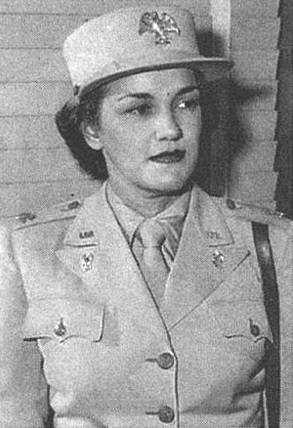Pioneering Lt. Col. Harriet West Waddy Fought Battles Within America’s WWII Army

This Black History Month, Wounded Warrior Project salutes hidden figures in the United States military. This installment honors the Army’s Lt. Col. Harriet M. West Waddy, a pioneer for African-American women in World War II.
“As an African-American woman there is not a single door [in Washington D.C.] that I can walk through; but as a Major in the WAC there is not a door I cannot walk through.” – Lt. Col. Harriet West Waddy
Let this sink in: more than 6,000 black women signed on with the Women's Army Auxiliary Corps during World War II.
World War II lasted only six years.
In a span of time that now seems like a blink in our history, black women flooded the United States Army in legions to serve their country and find new opportunities for independence, stability, and education.
The cloud of discrimination hung in the air, heavy and stifling as bomb smoke, in spite of the bravery it took to enlist. Black women were relegated mostly to positions that amounted to little more than glorified domestic staff.
About Harriet M. West Waddy
Harriet M. West Waddy had no way of knowing, as one of those thousands of women, she would significantly change the face of America’s armed forces for black women.
Born in Kansas on June 20, 1904, as Harriet M. Hardin, Waddy was brought up by her maternal grandmother. She went on to graduate from Kansas State College of Agriculture and Applied Science.
Waddy was known as First Officer Harriet M. West at the beginning of her enlistment. She had a different destiny in mind, even in the face of criticism for remaining in uniform while her military sisters suffered. Waddy, in a 1943 radio interview, made her view starkly clear. She said enlisting in a segregated military "which does not represent an ideal of democracy" did not mean "a retreat from our fight," but the opposite: a step closer to vanquishing the barriers of discrimination.
Accomplishments
There were many accomplishments for Harriet M. Waddy. Her career spanned over 25 years of America’s segregation era. Waddy's tenure started with the completion of her Women’s Army Corps (WAC) training at Fort Des Moines, Iowa.
Throughout World War II, only two black women received the rank of major during WAC training. Waddy was one of them. Once WAC became officially a part of the Army, her title changed to Lt. Colonel.
After her promotion in 1948, she served as an aide for WAC director Col. Oveta Culp Hobby. Here, she was ideally placed as an active agent to change inclusiveness for black women in the military. Her position as an adviser to the Army on racial issues meant having an amplified voice for spotlighting inequality in the armed forces.
To that end, Waddy recruited black women into the Army. Her assignment included gathering information from black women in WAC installations across America about their treatment.
The recipient of this report? First lady Eleanor Roosevelt.
In the 1930s, when Waddy collaborated with another civil rights pioneer – Mary McLeod Bethune – in the Bureau of Negro Affairs, her certainty about a singular point emerged: participation at every level of national affairs was the key to inclusion for African-Americans.
Upon graduation from the Adjutant General’s School of the Army, Waddy was tasked with a grave assignment: overseeing civilian typists to ensure families received letters about loved ones who were wounded, killed, or missing in action.
Although married four times, Waddy never had children. She was famously independent and relished the freedom to travel that the Army afforded her. Four years after her promotion to lieutenant colonel, she retired from active duty in 1952 – but remained in the Organized Reserve until 1969.
In 1999, Waddy died at the home of friends at age 94 in Las Vegas, Nevada. She was buried at the Southern Nevada Veterans Memorial Cemetery in Boulder City. Unfortunately, there was no funeral service at the time of her internment, until May 24, 2019, when a special memorial was held in her honor.
Female warriors and heroes alike never refer to themselves as such. The nature of being a hidden figure is to exhibit bravery in moments no one sees or hears, with no expectation of acknowledgment, but always with hope at the forefront of each action. And yet, each unseen and unheard heroic action pushes us all forward for the best.